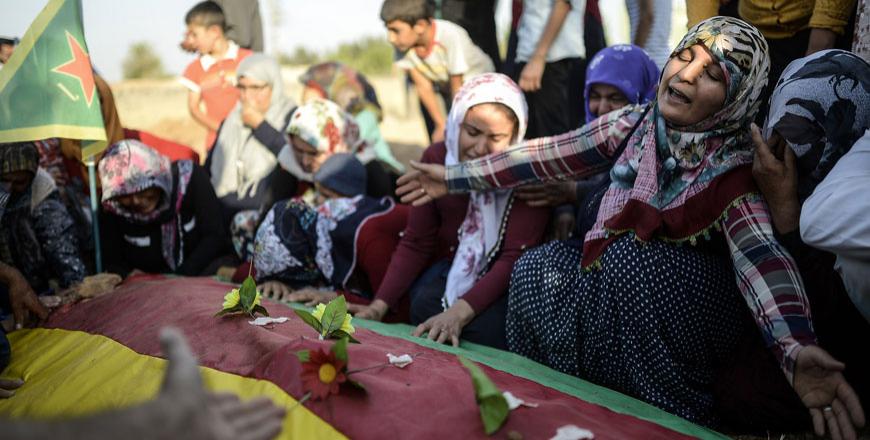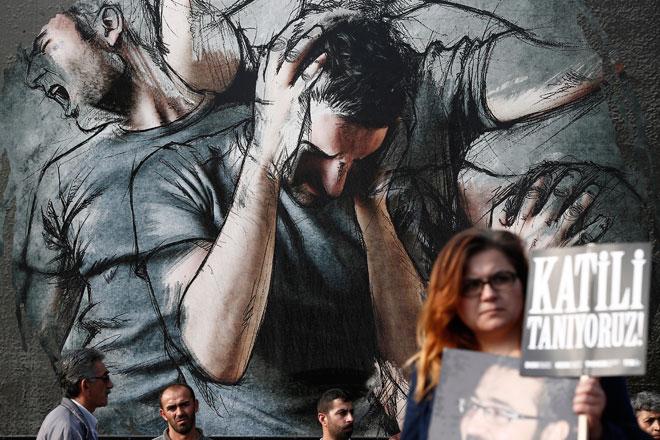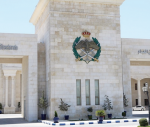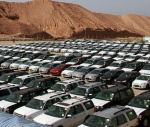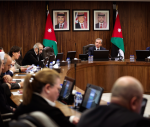You are here
Suicide bomber kills 30 in Turkey attack blamed on Daesh
By AFP - Jul 20,2015 - Last updated at Jul 20,2015

A wounded man waits for medical attention shortly after an explosion in the southeastern Turkish city of Suruc, near the Syrian border, on Monday (AP photo)
ANKARA — A suicide bomber attacked Monday a cultural centre hosting anti-Daesh activists in a Turkish town near the border with Syria, killing 30 people in an "act of terror" blamed on the jihadist group.
The blast ripped through the centre in Suruc, a town opposite the Syrian flashpoint of Kobani — which was itself later hit by a suicide car bombing.
Most of the dead were university students who had been planning a mission to help Kobani residents, according to a pro-Kurdish party official.
President Recep Tayyip Erdogan, on a visit to northern Cyprus, condemned the attack as an "act of terror".
"On behalf of my people, I curse and condemn the perpetrators of this brutality," he said. "Terror must be condemned no matter where it comes from."
The force of the explosion blew out the windows of the building and set off a blaze, witnesses said.
Television footage showed several people lying on the ground covered in blood and ambulances rushing to the scene.
"The Turkish authorities have strong reason to believe that the terrorist attack was perpetrated by ISIS [Daesh]," a government official told AFP.
If confirmed, it would be the first such attack by Daesh fighters against Turkey, a regional military power and NATO member.
The blast took place as an anti-Daesh group based at the cultural centre was preparing to announce a mission to Kobani.
Alp Altinors from the pro-Kurdish HDP party said the group from the Federation of Socialist Youth Associations was made up of about 300 people, mainly university students from across Turkey.
"They were planning to build parks in Kobani, hand out toys for children and paint school walls," he told AFP.
'Targeting Turkey's unity'
"The town is in chaos. Almost all the shops are closed in Suruc," local resident Mehmet Celik told AFP.
Russian President Vladimir Putin condemned the "barbaric act" and said in a statement: "Fighting terrorism requires an active cooperation from the whole international community."
EU enlargement commissioner Johannes Hahn said in a Twitter message: “Tragic consequences of Syrian conflict felt in a neighbouring country.”
Turkish Prime Minister Ahmet Davutoglu is sending three ministers to the southeastern region following the bombing, his office announced.
“We are calling on everyone to show common sense in the face of this terrorist attack targeting our country’s unity,” the interior ministry said.
In Kobani, a suicide bomber detonated a car bomb at a checkpoint, killing two members of Kurdish security forces, according to Rami Abdel Rahman, director of the Syrian Observatory for Human Rights.
Kobani has been a symbol of resistance against the jihadists since Daesh fighters were driven out by Syrian Kurdish forces in January.
Turkey’s Kurds were frustrated at the time at Ankara’s refusal to intervene to quash the Daesh insurgents, who have seized large parts of Syria and Iraq over the past year.
But in recent weeks, security forces have arrested dozens of Daesh militants and sympathisers in the most significant action by Ankara against the jihadists.
“It’s now obvious that the Turkish government has upgraded the threat posed by ISIS to among the top ones it is facing,” a Western diplomat told AFP last week.
Turkey has also boosted its border defences, stationing tanks and anti-aircraft missiles there as well as bolstering troop numbers.
The build-up has fed speculation that the government is planning to intervene in Syria to push Daesh jihadists back from the border and halt the advance of Kurdish forces who have made gains against the extremists.
Davutoglu has however ruled out any immediate action in Syria.
Turkey has been accused of tolerating or even aiding Daesh in the early stages of its existence as a useful ally against Syrian President Bashar Assad, whom Erdogan wants ousted.
Reluctant coalition member
Officials fiercely dismiss the criticism that Ankara is not doing enough to halt the flow of militants across the 911-kilometre border and say Turkey has deported more than 1,500 Daesh suspects and banned nearly 15,000 people from 98 countries from entering.
Ankara has categorised Daesh as a terrorist group since October 2013.
But Turkey has been a reluctant member of the anti-Daesh coalition led by the United States and refused to give its NATO ally the green-light for the use of Incirlik air base in the south for bombings against jihadist targets.
In January, Kurdish forces backed by rebel groups and US-led air strikes had pushed Daesh out of Kobani after four months of fierce fighting in a hugely symbolic defeat for the Islamists.
The Islamists made a surprise raid on Kobani last month but the fighters were driven back by Kurdish forces.
Suruc, once a centre of silk-making, is home to one of the biggest refugee camps in Turkey housing Syrians who have fled the bloody four-year conflict at home.
The camp shelters about 35,000 refugees out of a total of more than 1.8 million refugees taken in by Turkey since 2011.
Related Articles
SURUC, Turkey — Turkey said Tuesday it had identified a suspect over a devastating suicide bombing on the border with Syria blamed on Daesh
ANKARA — Kurdish militants on Wednesday claimed the murder of two Turkish police officers as revenge for a deadly suicide bombing near the S
ISTANBUL — Turkish prosecutors said Monday they had remanded four people in custody over a deadly Ankara attack, as the identity of one of t


